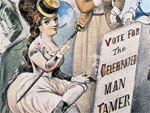1. "This Government is menaced with great danger, and that danger cannot be averted by the triumph of the party of protection, nor by that of free trade, nor by the triumph of single tax or of free silver. That danger lies in the votes possessed by the males in the slums of the cities, and the ignorant foreign vote which was sought to be bought up by each party, to make political success."
Carrie Chapman Catt, 1894: Some white women suffrage leaders were willing to use class, ethnic, and racial arguments to bolster the case for granting white women the vote. In 1894 (a year of extraordinary class conflict that included the national Pullman and coal strikes), Catt addressed an Iowa suffrage gathering and maintained that women’s suffrage was necessary to counter "the ignorant foreign vote" in American cities and protect the life and property of native-born Americans. See text here.
2. "Nothing strengthens the judgment and quickens the conscience like individual responsibility. Nothing adds such dignity to character as the recognition of one’s self-sovereignty; the right to an equal place, everywhere conceded—a place earned by personal merit, not an artificial attainment by inheritance, wealth, family and position."
Elizabeth Cady Stanton, 1892: Speaking to fellow suffragists on the occasion of her retirement as president of the National American Woman Suffrage Association, Stanton repeated this speech before a U.S. House Committee on the Judiciary and a U.S. Senate Committee on Woman Suffrage. The speech was published in the Woman's Journal and 10,000 copies of the text from the Congressional Record were reprinted and distributed throughout the country.
3. "I am not . . . in favor of making voters or jurors of negroes, nor of qualifying them . . . to intermarry with white people."
Abraham Lincoln, 1858: During his debates with Stephen Douglas, Lincoln referenced his concerns with race, reflecting prevalent nineteenth-century attitudes. At one point he even advocated black settlements in Haiti, Central America, or Africa. While his primary purpose was to preserve the Union, he issued the 1863 Emancipation Proclamation to free slaves, forever changing the construct of race in the United States. See the special edition of the Organization of American Historians' Magazine of History, vol. 21:4 (October 2007) for more information on Lincoln, race, and slavery.
4. "It is true that a strong plea for equal suffrage might be addressed to the national sense of honor."
Frederick Douglass, 1867: In January 1867, Douglass appealed to Congress for impartial suffrage. He believed that restrictions of rights for blacks restricted rights for all people, and that the nation needed the great potential strength located in African Americans, to share the burdens of society. Here is the full text of his speech.
5. "The vote is the most powerful instrument ever devised by man for breaking down injustice and destroying the terrible walls which imprison men because they are different from other men."
Lyndon B. Johnson, 1965: When the Voting Rights Bill was signed on August 6, 1965, Johnson addressed the nation from the Capitol Rotunda, calling the historic day a triumphal victory. He then charged the Attorney General to file a lawsuit against the constitutionality of poll taxes, and the Department of Justice to work to register voters who were previously denied the right. "I pledge you that we will not delay, or we will not hesitate, or we will not turn aside until Americans of every race and color and origin in this country have the same right as all others to share in the process of democracy." See full text here.
6. "Always vote for principle, though you may vote alone, and you may cherish the sweetest reflection that your vote is never lost."
John Quincy Adams: In 1824 the presidential race included five candidates: Speaker of the House Henry Clay, Secretary of Treasury William H. Crawford, Secretary of War John C. Calhoun, Andrew Jackson, and John Quincy Adams. After Crawford suffered a stroke, there was no clear favorite. No candidate had a majority of the electoral votes. According to the 12th Amendment, the election went to the House of Representatives to vote on the top three candidates: Jackson, Adams, and Crawford. As Speaker of the House, Clay voiced his support of Adams, who shared a similar platform. The House elected Adams, who became the only U.S. president who did not win the popular vote or the electoral vote.
7. "Voting is the most precious right of every citizen, and we have a moral obligation to ensure the integrity of our voting process."
Hillary Clinton, 2005: On February 17, 2005, U.S. Senators Hillary Clinton (D-NY) and Barbara Boxer (D-CA) presented comprehensive voting reform legislation to make sure that every American is able to vote and every vote is counted. The Count Every Vote Act was introduced but did not pass.

